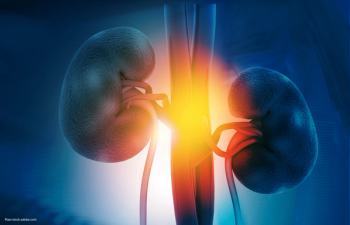
Cretostimogene grenadenorepvec is an intravesical oncolytic immunotherapy currently under investigation in phase 3 trials.

Cretostimogene grenadenorepvec is an intravesical oncolytic immunotherapy currently under investigation in phase 3 trials.

The novel oncolytic immunotherapy cretostimogene grenadenorepvec induced complete responses in three-fourths of patients with BCG-unresponsive non–muscle-invasive bladder cancer with carcinoma in situ, according to findings from the phase 3 BOND-003 trial.

Rohan Garje, MD, discusses recent research linking TP53, RB1, and PTEN mutations with worse overall survival outcomes in prostate cancer.

Clara Hwang, MD, is the lead author of the study, “Biomarker-Directed Therapy in Black and White Men With Metastatic Castration-Resistant Prostate Cancer.”

Over 60% of the analyzed abstracts contained language that did not follow the ASCO Language of Respect guidelines.

The finding came from a systematic review and meta-analysis involving 32,298 patients enrolled across the 75 studies.

Belzutifan extended the time to disease progression and was associated with improvements in QoL scores compared with everolimus.

Neeraj Agarwal, MD, discusses an analysis from the phase 3 TITAN trial that explored the correlation between PSA response and survival among patients with metastatic castration-sensitive prostate cancer receiving apalutamide.

The combination was explored in genomically defined metastatic renal cell carcinoma cohorts.

A post hoc analysis from the phase 3 CLEAR trial showed that frontline lenvatinib plus pembrolizumab elicited improved tumor response vs sunitinib across subgroups of patients with clear cell renal cell carcinoma.

In a recent interview, Rohan Garje, MD, chief of genitourinary oncology at the Miami Cancer Institute, discussed the evolving paradigm with PARP inhibitors in prostate cancer.

“Our results provide molecular insights for potential therapeutic strategies to treat prostate cancer and other AR-involved diseases by targeting AR multivalent interactions,” said Zhijie “Jason” Liu, PhD.

"A lot of patients with prostate cancer are going to receive one of these agents," says Tanya B. Dorff, MD.

The CAR T-cell therapy IVS-3001 is being explored in patients with previously treated, locally advanced or metastatic solid tumors that are HLA-G–positive.

The phase 3 RENOTORCH study is comparing the combination of the PD1-inhibitor toripalimab and axitinib with single-agent sunitinib in patients with renal cell carcinoma.

The study is exploring the investigational N-terminal domain androgen receptor inhibitor EPI-7386 in combination with either apalutamide or abiraterone acetate.

The data come from a sub-analysis of the pivotal phase 3 CONDOR trial of the PSMA-targeted radiopharmaceutical piflufolastat F 18 in men with suspected recurrence of prostate cancer.

“A majority of patients that present with bladder cancer do not have muscle invasive disease. They have earlier stage, non-muscle invasive, and the NCCN guidelines have detailed guidance for providers about managing those patients,” said Thomas Flaig, MD.

The phase 2 Cyto-KIK study is exploring cytoreductive surgery plus immunotherapy with nivolumab and targeted kinase inhibition with cabozantinib in metastatic kidney cancer.

Chad Tang, MD, discusses the EXTEND trial, which explored the addition of metastasis-directed therapy to intermittent hormone therapy in patients with oligometastatic prostate cancer.

Rezvilutamide is a novel androgen-receptor inhibitor with low blood–brain barrier penetration.

Study results presented at the 2022 AUA Annual Meeting showed that pembrolizumab plus cabazitaxel and gemcitabine had promising early efficacy in heavily pretreated patients with high-risk non–muscle invasive urothelial carcinoma.

FDA talks have led to a voluntary pause on the development of Vicineum for bladder cancer in the United States.

“The trial we're most interested in right now is the phase 3 VERACITY study of sabizabulin that was opened based on the results of this trial,” says Mark C. Markowski, MD, PhD.

In the phase 1b COSMIC-021 trial, the combination of cabozantinib and atezolizumab showed clinical activity with manageable toxicity across several setting in urothelial carcinoma.

The study data strongly support PSA screening, particularly in Black men, for whom there is a paucity of clinical trial evidence, according to lead author Spyridon Basourakos, MD.

The OS was significantly longer in the avelumab plus BSC vs BSC alone arm in all randomized patients, as well as in patients with PD-L1-positive tumors.

In the DS8201-A-U105 trial, the combination of the antibody-drug conjugate trastuzumab deruxtecan and the immunotherapy nivolumab demonstrated antitumor activity in patients with HER2-expressing urothelial carcinoma.

Richard Wahl, MD, president of the Society of Nuclear Medicine and Molecular Imaging, highlights the approval of 177Lu-PSMA-617 (Lu 177 vipivotide tetraxetan) as the first targeted radioligand therapy for the treatment of progressive, PSMA-positive metastatic castration-resistant prostate cancer.

Published: June 18th 2024 | Updated: